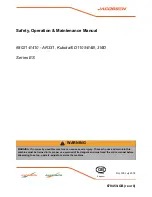
27
GB
8.2.2 Blade
For safety reasons you should only ever have your
blade sharpened, balanced and mounted by an
authorized service workshop. For optimum results it
is recommended that the blade should be inspected
once a year.
Changing the blade (Fig. 8)
Only ever use original spare parts when having the
blade replaced. The marking on the blade must be
matched with the number given in the list of spare
parts. Never have any other model of blade fitted.
Damaged blades
Should the blade, in spite of all precautions, come
into contact with an obstruction, shut down the
engine immediately and pull the spark plug boot. Tip
the lawn mower onto its side and check the blade for
damage. Damaged or bent blades must be replaced.
Never attempt to bend a bent blade back to straight
again. Never mow the lawn with a bent or heavily
worn blade as this will cause vibrations and can lead
to further damage to the lawn mower.
Important:
There is a risk of injury if you work with a
damaged blade.
Resharpening the blade
The blades can be resharpened with a metal file. In
order to avoid imbalance, the blade should be
resharpened by an authorized service workshop.
8.2.3 Care and adjustment of the cables
Oil the cables at regular intervals and check that they
move easily.
8.2.4
Inspecting the V-belt
To inspect the V-belt you must remove the V-belt
cover (Fig. 8/Item D).
8.2.5 Repairs
After any repair or maintenance work, check that all
safety-related parts are in place and in proper
working order.
All parts which may cause injury must be kept where
they are inaccessible to children or others.
Important:
In accordance with product liability
legislation we are not liable for any damages caused
by improper repairs or the use of spare parts that are
not original spare parts or parts approved by us. In
addition, we are also not liable for any damages
arising from improper repairs. Such work should be
performed by a customer services workshop or
authorized specialist. The same applies to accessory
parts.
8.2.6 Times of use
Lawn mowers are only permitted to be used on
workdays between the hours of 7.00 a.m. and 7.00
p.m. Please comply with statutory regulations, which
may vary from location to location.
8.3 Preparing the mower for long-term storage
Caution:
Do not empty the petrol tank in enclosed
areas, near fire or when smoking. Petrol fumes can
cause explosions and fire.
1. Empty the petrol tank with a petrol suction pump.
2. Start the engine and let it run until any remaining
petrol has been used up.
3. Be sure to clean the entire machine to protect
the paint.
4. Store the machine in a well-ventilated place.
8.4 Preparing the mower for transportation
1. Empty the petrol tank (see item 6.3.1).
2. Always let the engine run until it has used up the
remainder of petrol in the tank.
3. Empty the engine oil from the warm engine.
4. Remove the spark plug boot from the spark plug.
5.
Cleaning the equipment.
6. Remove the start tension cable from the hook
(Fig. 3c). Slacken the wing nuts and fold down
the upper push bar.
7. Wedge a few layers of corrugated cardboard
between the upper and lower push bars and the
engine in order to prevent any chafing.
8.5 Ordering replacement parts
Please quote the following data when ordering
replacement parts:
앬
Type of machine
앬
Article number of the machine
앬
Identification number of the machine
앬
Replacement part number of the part required
For our latest prices and information please go to
www.isc-gmbh.info
9. Disposal and recycling
The unit is supplied in packaging to prevent its being
damaged in transit. This packaging is raw material
and can therefore be reused or can be returned to
the raw material system.
The unit and its accessories are made of various
types of material, such as metal and plastic.
Defective components must be disposed of as
special waste. Ask your dealer or your local council.
Anleitung_RG_PM_51_VS_BS_SPK7:_ 02.11.2010 6:26 Uhr Seite 27
















































